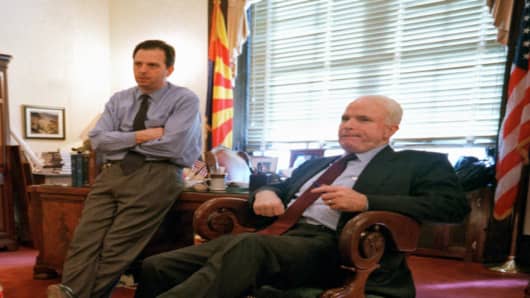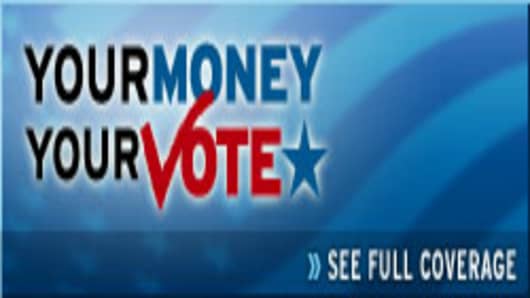John McCain denied a romantic relationship with a female telecommunications lobbyist on Thursday and said a report by The New York Times suggesting favoritism for her clients is "not true."
"I'm very disappointed in the article. It's not true," the likely Republican presidential nominee said as his wife, Cindy, stood alongside him during a news conference called to address the matter.
McCain described the woman in question, lobbyist Vicki Iseman, as a friend.
The newspaper quoted anonymous aides as saying they had urged McCain and Iseman to stay away from each otherprior to his failed presidential campaign in 2000. In its own follow-up story, The Washington Post quoted longtime aide John Weaver, who split with McCain last year, as saying he met with lobbyist Iseman and urged her to steer clear of McCain.
Weaver told the Times he arranged the meeting after "a discussion among the campaign leadership" about Iseman.
But McCain said he was unaware of any such conversation. "I never discussed it with John Weaver. As far as I know, there was no necessity for it ... I did not know anything about it," he said.
The Arizona senator said he won't allow the report to distract him from his presidential campaign.
"I will focus my attention in this campaign on the big issues and on the challenges that face this country," he said.
His wife also took issue with the newspaper, and said she trusts her husband.
"He's a man of great character," Cindy McCain said.
In late 1999, McCain twice wrote letters to the Federal Communications Commission on behalf of Florida-based Paxson Communications - which had paid Iseman as its lobbyist - urging quick consideration of a proposal to buy a television station license in Pittsburgh. At the time, Paxson's chief executive, Lowell W. "Bud" Paxson, also was a major contributor to McCain's 2000 presidential campaign.
McCain did not urge the FCC commissioners to approve the proposal, but he asked for speedy consideration of the deal, which was pending from two years earlier.
In an unusual response, then-FCC Chairman William Kennard complained that McCain's request "comes at a sensitive time in the deliberative process" and "could have procedural and substantive impacts on the commission's deliberations and, thus, on the due process rights of the parties."
McCain wrote the letters after he received more than $20,000 in contributions from Paxson executives and lobbyists. Paxson also lent McCain his company's jet at least four times during 1999 for campaign travel.
He defended his integrity last December, after he was questioned about reports that the Times was investigating allegations of legislative favoritism by the Arizona Republican and that his aides had been trying to dissuade the newspaper from publishing a story.
"I've never done any favors for anybody - lobbyist or special-interest group. That's a clear, 24-year record," he told reporters.
McCain and four other senators were accused two decades ago of trying to influence banking regulators on behalf of Charles Keating, a savings and loan financier later convicted of securities fraud. The Senate Ethics Committee ultimately decided that McCain had used "poor judgment" but that his actions "were not improper" and warranted no penalty.
McCain has said that episode helped spur his drive to change campaign finance laws in an attempt to reduce the influence of money in politics.
Over the past 12 hours, the McCain campaign has sought to discredit the report, deploying senior advisers who have called it a smear campaign to destroy the Republican nominee-in-waiting.
Robert Bennett, a Washington attorney representing McCain, said McCain's staff provided the Times with "approximately 12 instances where Senator McCain took positions adverse to this lobbyist's clients and her public relations firm's clients," but none of the examples were included in the paper's story.
"There is no evidence that John McCain ever breached the public trust and that is the issue and the only issue," Bennett, who once represented former President Clinton, told NBC's "Today" show on Thursday.



